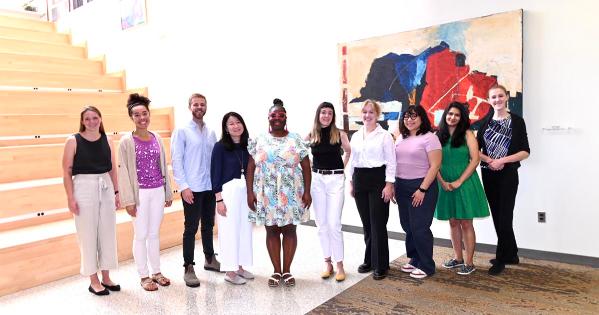Prioritizing Equity and Inclusion in Carbon Removal Policy

As carbon removal increasingly plays a major role in response to climate change, a new fellowship program at American University’s Institute for Carbon Removal Law and Policy aims to center justice and equity considerations in carbon removal policy. Funding for the program comes from the Chan Zuckerberg Initiative and the New York Community Trust. The National Wildlife Federation is a partner in the fellowship.
“Globally and in the United States, critical voices have been left out of policy and decision making in addressing many aspects of climate,” said Institute director and AU School of International Service Prof. Simon Nicholson. “While progress has been made, we have an opportunity with carbon removal to not repeat this history. Thanks to generous funding from the Chan Zuckerberg Initiative and the New York Community Trust, the Institute for Carbon Removal Law and Policy will play its part in making sure that carbon removal developments are guided by and to the benefit of those who face the most significant harms from climate change and the fossil fuel economy.”
The Carbon Removal Justice Fellows Program is a selective, competitive fellowship. The Institute and NWF selected 11 early career professionals and scientists from across the nation and two locations abroad to participate in an intensive, two-week program on the equity and justice dimensions of carbon removal. One of the fellows will stay on in D.C. and work with NWF to guide their peers from their respective locations for a year of continued engagement. The fellows hail from organizations and universities including West Virginia Rivers Coalition, Our Climate Education Fund, and The Vessel Project of Louisiana and Texas Campaign for the Environment.
“We’re looking forward to collaborating with this impressive group of individuals from across the country and the world,” said Shannon Heyck-Williams, associate vice president of climate and energy for NWF. “Carbon removal is an important tool for addressing global warming – and we need to ensure that the industry and policy move forward in a way that centers equity and justice.”
The fellows will spend a week in D.C., meeting with stakeholders in carbon removal, followed by visits in key congressional offices, government agencies, environmental and justice organizations, and academia. The fellows will then spend the first few days of the second week in New York to engage with environmental justice leaders, representatives of early-stage carbon removal start-ups, and analysts of state-level regulation. Then, they will travel to Wyoming for joint programming with other fellows in the long-standing Research Experience in Carbon Sequestration initiative of the U.S. Department of Energy.
"As an engineer by training, I recognize that human civilization now faces an urgent challenge to rapidly upscale carbon dioxide removal as a key part of reaching net zero emissions,” said fellow Xiangkun (Elvis) Cao, of the Massachusetts Institute of Technology. “I am excited to join the Carbon Removal Justice Fellows Program to learn about the societal, economic, and environmental considerations that are critical in carbon dioxide removal development and deployment."
The Institute for Carbon Removal Law and Policy in AU’s School of International Service has been working since 2018 to help inform academic, social, and policy developments surrounding carbon removal. Carbon removal encompasses a wide variety of different technologies and processes that pull carbon dioxide out of the atmosphere and put it into storage. An important part of the Institute’s work is to ensure that justice and equity considerations are present at every stage of the carbon removal enterprise, from early-stage investigation of options through deployment.
Scientific assessments make clear that carbon removal will now, as a supplement to rapid and deep decarbonization of all parts of the global economy, be an essential component of humanity’s response to climate change. More about the technologies and approaches for carbon removal can be found at the Institute’s resources page.
